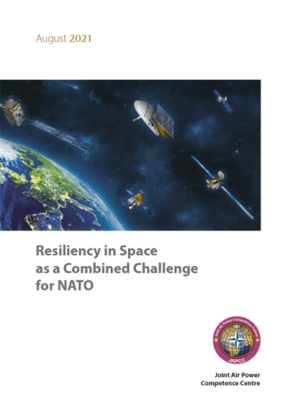Today’s military operations rely significantly on Space support. NATO Allies are operating modern and technically advanced armed forces. This technical advantage can be seen as a kind of deterrence, but recent worldwide developments in counter-Space and Space technology are challenging NATO’s technical advantage.
Spacefaring nations such as the ones inside the Alliance attempt to secure their Space-based services as much as possible and design them to be as resilient as realizable. This is accomplished mostly through technical protection means or redundancies. NATO as an agreed-upon non Space actor (as of today) has to organize a different approach to resiliency. The overall goal for NATO is to ensure persistent Space support that is provided by the nations or commercially purchased. In NATO, the responsibility to provide Space support is mostly taken on by the USA. Due to technical developments, more NATO nations have established Space services or developed Space-related products and are willing to offer them to NATO, which should not be seen as a competition but as a chance to gain resiliency by burden-sharing. This may include a more federated Space support by the Allies to be beneficial to NATO.
This White Paper assesses dependencies stated in national and relevant NATO doctrine. It addresses Space functional areas and their importance based on current and historical NATO operations. A wide threat assessment is undertaken, based on the capability as well as the foreseeable threats in different operation types and intensities. Potential outcomes are discussed and addressed.
As planning considerations, the term ‘resiliency‘ and its adaption for NATO is discussed, and the current Space support organization in NATO is addressed. This includes a deeper look into the role of various NATO agencies dealing with Space topics, as well as the chances and challenges of commercial Space support. Resiliency for NATO in this context means in NATO´s current role that coordination and organization is in the focus. It also gives an outlook for potentially changing responsibilities of NATO in the future.
Based on a questionnaire where the majority of the NATO member nations formulated their requirements, a deeper analysis about future means of resiliency for NATO was undertaken. In conjunction with the above-mentioned analysis, advice is given to be considered in the future planning of the implementation of the Space domain inside NATO.
All this leads to a conclusion and the formulation of recommendations for NATO to increase its resiliency in Space. For the unique role of NATO in not being an ‘autonomous‘ Space actor, options to achieve resiliency by ensuring a persistent and robust Space support provision to NATO are discussed.
This White Paper provides recommendations to NATO internally and to spacefaring Allies, as well as to member nations that are interested in or currently working on implementing Space support in their armed forces. Finally, it should provide a wider perspective and help understand the complex topic of Space support in NATO operations.












